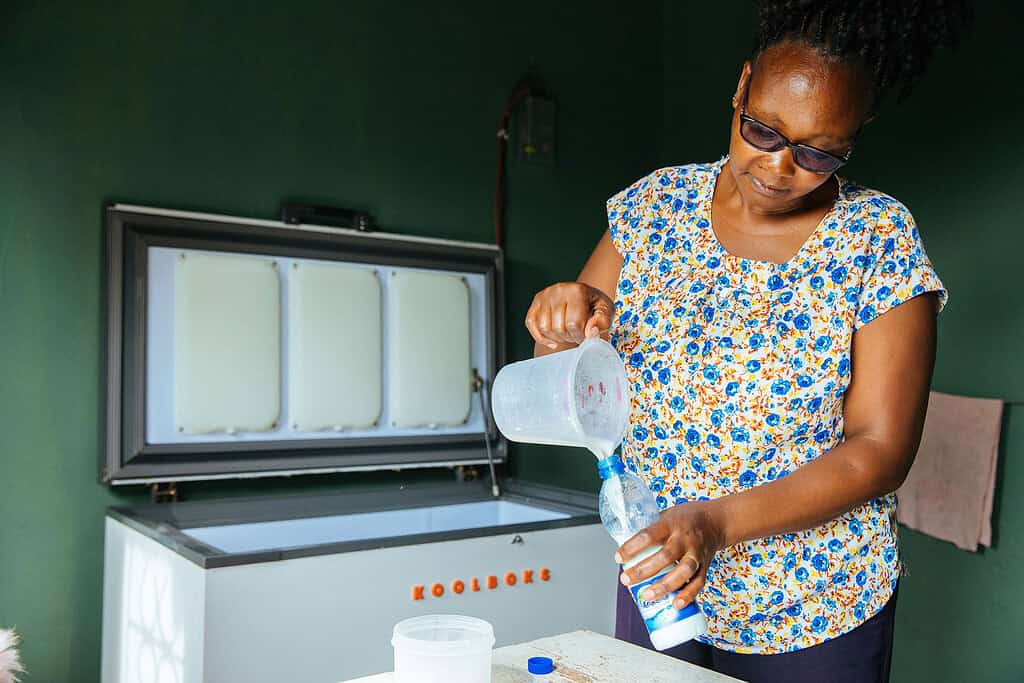Koolboks
Innovation is cool in Nigeria
- Case Study
- Renewable energy
- West Africa
- 2022

Koolboks provides solar-powered refrigeration to micro-entrepreneurs in Nigeria. Through innovation and a commitment to customer needs, the company has been able to improve the incomes and quality of life of micro-entrepreneurs.
The problem
Millions of Nigerian micro-entrepreneurs, like restaurant owners, market traders, and shopkeepers, are well-placed to offer fresh produce, frozen goods, and chilled drinks, but unreliable electricity grids and the high cost of traditional refrigerators make it an impossible reality. Frequent power outages threaten their stock, leading to lost income and mountains of wasted food. Even those who can afford a refrigerator often need a backup generator, adding another layer of expense. Up to 30% of post-harvest food ends up lost in Nigeria due to these challenges, impacting food security and hindering business growth.
The solution
Koolboks provides access to solar-powered refrigerators, which eliminate dependence on unreliable grids, ensuring food stays fresh even during power cuts.
Koolboks’ products offer cooling at 50% less than the costs incurred for 12 hours of daily grid power or gas generators. Their innovative ice thermal batteries reduce the overall cost of the appliance by up to 40% compared to similar-sized solar power freezers. Additionally, pay-as-you-go financing enables access for low-income consumers, eliminating upfront costs and onerous loan processes.
The origin
Koolboks was founded in 2018 by Ayoola Dominic and Deborah Gael. The company initially designed and produced thermal coolers for the camping market in Europe, but quickly realized their innovations could have far greater impact, and reach a much larger market, in Ayoola’s home country of Nigeria.
The impact
Koolboks’ products increase the incomes of low-income families while also reducing food waste by providing cooling to micro-entrepreneurs across Africa. Before Koolboks, energy expenses topped the budget for one-third of businesses, with 19% spending more than $25 per week on grid electricity and fuel for small generators. Koolboks radically reduces that spending over the lifetime of the freezer.
The company has a strong gender impact, with the majority of businesses that Koolboks targets being women-led. 63% of their customers are shop-owners and market traders run by women. To date, over 6,000 solar fridges have been sold across 17 different countries worldwide.
“It has been very good and effective, since there is no electricity in my area,” says a Koolboks customer in Nigeria. “The freezer has been of great help for my frozen food business. I now sell more.”
The investment
Acumen invested as part of Koolboks’ $2.5 million seed round in 2022 due to the company’s potential to substantially increase the incomes of low-income families, reduce food waste, and catalyze the productive use of energy (PUE) space in Nigeria. This was the last investment under our Pioneer Energy Investment Initiative (PEII), and paved the way for our deeper focus on PUE via our PEII+ initiative.
The story
Operating in some of the most demanding environments for cold storage, Koolboks has thrived by innovating its technology while remaining deeply attuned to its customers’ needs.
Upon launching in Lagos, Nigeria, Koolboks quickly realized that reliability was the most important priority for customers. Power outages can destroy stock and cripple a micro-enterprise selling perishable goods such as frozen fish and meat. Therefore, building up the team’s capacity to quickly respond to after-sales issues as well as focusing on creating reliable products has been key to creating trust in their brand.
“It increases my sales. Because my drinks and fish are always iced, more customers prefer to buy from me, and it increases my sales and my profit also thereby improving my quality of life.”
Woman customer of Koolboks
More than 75 agents and 20 field team staff now work to respond to customer issues, helping them understand the product, troubleshoot minor issues, or dispatch an engineer when needed. Koolboks is now expanding this team by creating regional hubs to ensure customer service is as close as possible to their customers, wherever they are in the country. Teaching customers about their new product has been equally as important. New customers go through a one-hour onboarding call to ensure they understand how to make payments, load the freezer, charge and use the battery, and troubleshoot problems.
Putting customers first, Koolboks designed their products around real-world usage rather than trying to change user behavior. Earlier models focused on efficiency to keep costs as low as possible. However, the most efficient compressors struggled with how customers wanted to use the product. Frozen food traders operate out of poorly ventilated rooms, their freezers are filled to the brim, and they are opened frequently. Koolboks had to balance efficiency with those user needs. They redesigned their compressor to add a number of small fans that would keep it well ventilated. The extra cost was worth it to cater to their users’ needs.
Tech innovation has allowed Koolboks to create an affordable product for solving the challenges of limited electricity for shopkeepers and traders. Through a focus on customer needs, Koolboks has ensured their products simultaneously increase the incomes of micro-entrepreneurs across Africa.